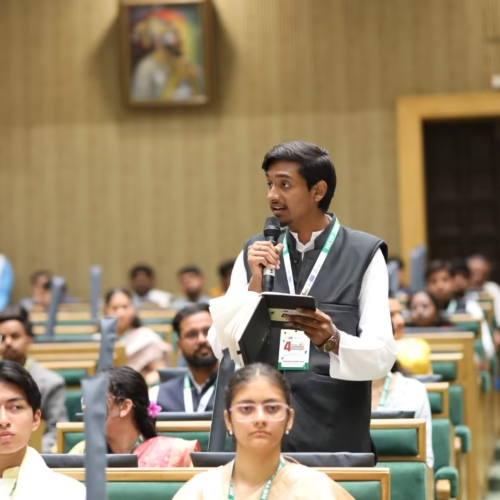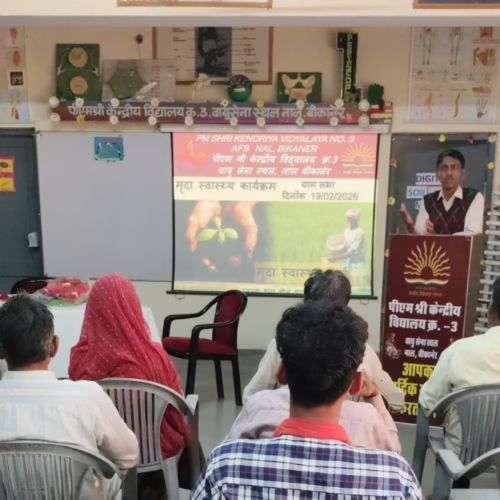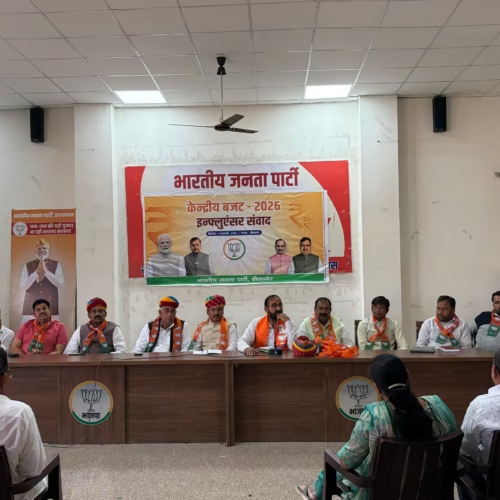Dr. Ajay Kumar Appointed as Chairman of UPSC: A Technocrat’s Ascent to the Helm of India’s Premier Civil Services Institution
By Defence Journalist Sahil
New Delhi | May 14, 2025
In a decision that underscores India’s shifting governance paradigm towards meritocracy, technology, and reform-oriented leadership, the Government of India has appointed Dr. Ajay Kumar, former Defence Secretary and veteran civil servant, as the Chairman of the Union Public Service Commission (UPSC) — the constitutional authority tasked with selecting India’s civil servants, foreign service officers, and top bureaucratic talent.
His appointment follows the retirement of Ms. Preeti Sudan, a 1983-batch IAS officer of the Andhra Pradesh cadre, who demitted office on April 29, 2025. Dr. Kumar will hold office until October 2027, when he reaches the age of 65.
Who is Dr. Ajay Kumar?
Dr. Ajay Kumar, a 1985-batch IAS officer of the Kerala cadre, is widely regarded as one of the most dynamic and tech-savvy bureaucrats of his generation. A product of IIT Kanpur, where he graduated in electrical engineering, he went on to earn a Master’s in Development Economics and a Ph.D. in Business Administration from the University of Minnesota, USA.
With over three decades of service in both the Union Government and the Government of Kerala, Dr. Kumar’s tenure has been marked by innovation, institutional reform, and digital transformation. His experience spans across defence, information technology, public procurement, and e-governance.
Tenure as Defence Secretary: Reformer in Uniform
Dr. Ajay Kumar’s legacy as India’s Defence Secretary (August 2019 – October 2022) is transformative. He was at the heart of some of the most consequential reforms in post-Independence Indian military history, including:
- Creation of the post of Chief of Defence Staff (CDS): A long-pending structural reform to foster jointness in tri-service operations.
- Launch of the Agnipath recruitment scheme: A radical overhaul of military recruitment aimed at youth engagement and budgetary efficiency.
- Corporatisation of the Ordnance Factory Board (OFB): A landmark move to enhance productivity, autonomy, and accountability in defence production.
- Strengthening of Defence Acquisition Process (DAP) and defence indigenisation under Atmanirbhar Bharat.
Dr. Kumar also played a crucial role in expanding India’s defence innovation ecosystem through initiatives like the Innovation for Defence Excellence (iDEX) program and start-up incubation support.
Digital Trailblazer and Policy Strategist
Before his elevation to Defence Secretary, Dr. Kumar was Secretary, Defence Production, and prior to that, he served in the Ministry of Electronics & Information Technology (MeitY). At MeitY, he championed major pillars of the Digital India movement — overseeing critical projects like MyGov, Jeevan Pramaan, GeM (Government e-Marketplace), and the Cyber Surakshit Bharat initiative.
As Joint Secretary, he facilitated the policy formulation of Aadhaar, Digital Locker, and the early rollout of UPI, which now powers India’s digital economy.
In the Kerala state government, he was Principal Secretary (IT), where he led the rollout of broadband infrastructure and single-window digital governance in one of India’s most progressive states.
Post-Retirement Public Service and Thought Leadership
Unlike many retired bureaucrats who fade into corporate sinecures, Dr. Kumar chose to stay close to public interest work. In 2023, he co-founded MGF-Kavachh, a ₹250 crore defence-focused venture fund aimed at empowering start-ups in the military-tech space. He also served as:
- Visiting Professor at IIT Kanpur (Public Policy & Governance)
- Senior Fellow at Carnegie India, where he contributed papers on national security reform
- Advisor to the Ministry of Defence on futuristic capability planning
He is a firm believer in using technology not only as a tool of governance but as an ethical force for transparency, inclusivity, and public accountability.
What His Appointment Means for UPSC
The UPSC is one of India’s most trusted constitutional institutions, known for its impartiality, rigour, and procedural fairness in conducting civil services examinations. But with changing times — the rise of digital tools, the need for inclusivity, and demand for systemic transparency — the institution must evolve.
With Dr. Kumar’s entry, UPSC is likely to witness:
- Greater adoption of AI, data analytics, and tech-driven evaluation systems
- Robust cyber-security measures in examination conduct
- Diversity-friendly outreach policies, particularly towards underrepresented regions
- Modernisation of exam syllabi to include emerging domains like climate policy, cyber law, national security, and disruptive technologies
Experts also anticipate reforms in the interview process, with more stress on behavioural insights, emotional intelligence, and domain knowledge rather than rote-based replies.
Strategic Message from the Modi Government
Dr. Kumar’s appointment fits a broader pattern under the Modi government — of placing reformist technocrats in top constitutional or institutional roles. From CAG to TRAI, ECI to UPSC, India’s governance structure is gradually shifting from “status quoist legacy” to “merit-based modernisation.”
His tenure also aligns with the government’s Viksit Bharat @2047 vision, which demands a leaner, smarter, and citizen-centric bureaucracy equipped to deal with future challenges — be it climate migration, hybrid warfare, or digital regulation.
Conclusion: From Commanding Defence to Shaping Governance
Dr. Ajay Kumar’s arrival at the UPSC signifies more than just an appointment. It reflects a reimagining of India’s governance ethos, where technocratic excellence, ethical integrity, and national interest converge. If past performance is an indicator, his tenure may redefine how India selects its future leaders — with vision, innovation, and integrity at the core.
पूर्व रक्षा सचिव डॉ. अजय कुमार बने UPSC के अध्यक्ष: नौकरशाही में तकनीक, पारदर्शिता और सुधार की नई लहर
DEFENCE JOURNALIST SAHIL
नई दिल्ली | 14 मई 2025
भारत सरकार ने एक महत्वपूर्ण फैसले में पूर्व रक्षा सचिव डॉ. अजय कुमार को संघ लोक सेवा आयोग (UPSC) का नया अध्यक्ष नियुक्त किया है। यह आयोग भारतीय प्रशासनिक सेवा (IAS), भारतीय विदेश सेवा (IFS) और अन्य केंद्रीय सेवाओं के अधिकारियों की चयन प्रक्रिया के लिए जिम्मेदार संवैधानिक संस्था है।
यह नियुक्ति पूर्व अध्यक्ष प्रीति सूदन के 29 अप्रैल 2025 को कार्यमुक्त होने के बाद की गई है। डॉ. अजय कुमार का कार्यकाल अक्टूबर 2027 तक रहेगा।
डॉ. अजय कुमार: एक परिचय
डॉ. अजय कुमार 1985 बैच के केरल कैडर के आईएएस अधिकारी हैं। उन्होंने IIT कानपुर से इलेक्ट्रिकल इंजीनियरिंग में स्नातक किया और बाद में यूनिवर्सिटी ऑफ मिनेसोटा, अमेरिका से विकास अर्थशास्त्र में मास्टर्स तथा बिजनेस एडमिनिस्ट्रेशन में पीएचडी की डिग्री प्राप्त की।
उन्होंने तीन दशकों से अधिक की सेवा के दौरान रक्षा, डिजिटल इंडिया, ई-गवर्नेंस और नीति निर्माण जैसे विविध क्षेत्रों में काम किया है। उनका कार्यकाल हमेशा नवाचार और पारदर्शिता का प्रतीक रहा है।
रक्षा सचिव के रूप में परिवर्तनकारी भूमिका
रक्षा सचिव के रूप में (अगस्त 2019 – अक्टूबर 2022), डॉ. कुमार ने कई ऐतिहासिक कदम उठाए, जिनमें शामिल हैं:
- चीफ ऑफ डिफेंस स्टाफ (CDS) का सृजन, जिससे तीनों सेनाओं में समन्वय बढ़ा।
- अग्निपथ योजना, जो युवा और बजट-अनुकूल सैन्य भर्ती मॉडल है।
- आयुध निर्माणी बोर्ड का निगमीकरण, जिससे रक्षा उत्पादन को प्रतिस्पर्धी बनाया गया।
- iDEX कार्यक्रम के माध्यम से रक्षा स्टार्टअप्स को बढ़ावा।
डिजिटल इंडिया के शिल्पकार
इलेक्ट्रॉनिक्स एवं आईटी मंत्रालय में कार्यरत रहते हुए, उन्होंने MyGov, GeM, Jeevan Pramaan, और Cyber Surakshit Bharat जैसे कार्यक्रमों का नेतृत्व किया। Aadhaar और UPI जैसे नवाचारों के पीछे नीति निर्धारण में उनकी अहम भूमिका रही।
केरल सरकार में उन्होंने ई-गवर्नेंस, आईटी इन्फ्रास्ट्रक्चर, और सिंगल विंडो क्लियरेंस जैसे सुधार किए।
सेवानिवृत्ति के बाद भी सक्रिय राष्ट्रसेवा
डॉ. कुमार सेवानिवृत्ति के बाद भी सार्वजनिक जीवन में सक्रिय रहे। उन्होंने 2023 में MGF-Kavachh नामक ₹250 करोड़ का रक्षा स्टार्टअप फंड लॉन्च किया। साथ ही, उन्होंने:
- IIT कानपुर में विजिटिंग प्रोफेसर के रूप में अध्यापन किया
- कार्नेगी इंडिया के वरिष्ठ फेलो के रूप में नीतिगत शोध किया
- रक्षा मंत्रालय के सलाहकार के रूप में कार्य किया
UPSC में क्या बदल सकता है?
उनकी नियुक्ति से UPSC में कई संभावित बदलाव देखे जा सकते हैं:
- कृत्रिम बुद्धिमत्ता और डेटा एनालिटिक्स का प्रयोग
- डिजिटली संरक्षित और पारदर्शी परीक्षा प्रणाली
- साक्षात्कार प्रक्रिया में आधुनिक मनोवैज्ञानिक मूल्यांकन
- नवीन विषयों जैसे कि जलवायु नीति, साइबर कानून, राष्ट्रीय सुरक्षा आदि को पाठ्यक्रम में शामिल करना
सरकार का रणनीतिक संदेश
मोदी सरकार द्वारा लगातार संस्थानों में टेक्नोक्रेटिक नेतृत्व को प्राथमिकता देना — जैसे कि CAG, TRAI, ECI — अब UPSC तक पहुंच गया है। यह भारत की प्रशासनिक व्यवस्था को 2047 तक के लिए सक्षम, पारदर्शी और प्रौद्योगिकी-केंद्रित बनाने की दिशा में एक बड़ा संकेत है।
निष्कर्ष: एक रणनीतिकार अब अफसरों का चयन करेगा
डॉ. अजय कुमार की UPSC में नियुक्ति केवल एक प्रशासनिक बदलाव नहीं, बल्कि नवाचार, राष्ट्रहित और जवाबदेही के संगम का प्रतीक है। आने वाले वर्षों में उनकी अध्यक्षता भारत को ऐसे नौकरशाह दे सकती है, जो दूरदर्शिता, नैतिकता और दक्षता से भारत के भविष्य का निर्माण करें।












Add Comment